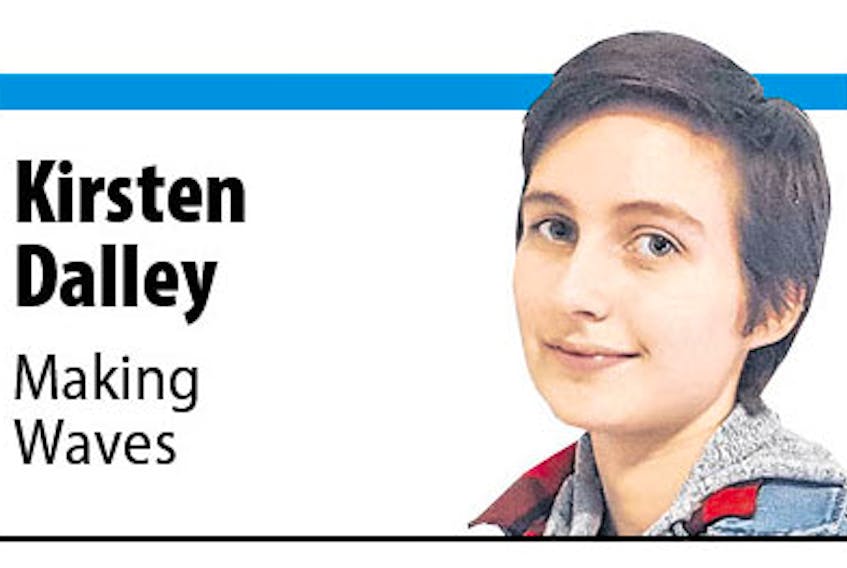Our health-care system sucks.
At the beginning of February, the province recognized Eating Disorder Awareness Week. While it was recognized by our provincial government, the majority of the programming to promote awareness of the impact of eating disorders, as well as the resources available in our province, was hosted by the Eating Disorder Foundation of NL. Like many general health-related topics, the government didn’t put much effort into promoting awareness.
The lack of health promotion is astounding, and things get even more contentious when it comes to mental health. We have walk-in services such as Doorways and the wait list to see a therapist in some communities is only two weeks, which is an improvement.
However, we turn our backs on those with chronic conditions and leave them alone to navigate the maze of long wait lists for psychiatrists, scarce inpatient care units, and subpar living conditions in the Waterford – more aptly nicknamed “the mental” – which is the province’s only dedicated mental health facility.
I often think about Minister of Health Dr. John Haggie’s 10-year agreement with the federal government for greater mental health funding. He was right in saying it hasn’t been transformational.
For Eating Disorder Awareness Week there were several events such as a lighting of the confederation building, a flag raising, and a presentation of artwork to the Health Sciences’ inpatient unit. It wasn’t a well-publicized series of events, and I had only found out about them because I finished up the eating disorder inpatient program and was discharged from the hospital that Monday, so I had heard murmurs among program staff. When I told my mom, who has become involved in workshops and groups with the Eating Disorder Foundation of Newfoundland since my admission in December, she was also surprised that there were quite a few things on the go in the city. She had heard nothing about it back home in central. I wasn’t able to attend anything because I wasn’t exactly well on discharge, but I was able to watch the presentation of artwork live on Facebook. Haggie spoke briefly, and he didn’t disappoint.
If you’re a politician and you’re wondering how to begin a speech, please do not begin with the phrase, “I don’t have a lot of prepared remarks today.” It is, in fact, quite offensive to those suffering with such an illness. To rub more salt in the wound, he then referred to those struggling with eating disorders as “people who walk down a certain road with eating challenges.”
When I think of eating challenges, I think of dropping my fork or having burnt toast.
Eating disorders are not a simple struggle or challenge. Eating disorders are a disease. They’re a horrible voice inside your head that tells you you’re not worth the salad in the fridge or the glass of water on your bedside table. They’re the voice inside your head that pushes you to pace your bedroom until 4 a.m. to burn more calories. They’re the voice that drowns out all rationality so when someone says you’re too sick to drive you laugh it off, even when you nearly miss that accident you almost caused because you’re so out of it. They’re the voice that tells you to eat all of the food in the house, right now, until you’re so full you’re sure you’ve done some sort of damage to yourself. It’s not an eating challenge. It’s a disorder, or as Haggie says, “a disorder, if you will.”
Haggie then reminded us of all of the progress we are making in mental health care. We are now including families in recovery, we are building a new Waterford (potentially). Things are beginning to look “less like an institution” and surely these new pictures for the family room will make it “look like a home.”
From somebody who spent eight full weeks on the psychiatric-ward-turned-eating-disorder unit at the Health Sciences, there is no making that place look like a home. I will say that they have done a very good job of making common spaces more welcoming. Patient artwork hangs in the dining room and there is a place for patients to spend time with other eating disorder patients as well as a place for them to spend time with family and friends. Otherwise, there is no losing the institutional feel. Patient bedrooms are standard hospital rooms. Furniture is stiff and uncomfortable. Everything is painted a “therapeutic” colour and the lack of everyday comforts is always noticeable.
The eating disorder unit/psychiatric ward is also located in the basement, across from food services. The hallway leading down to it is really sad and still not renovated, the directions to get there are confusing, and there’s not really that much natural light. It’s not completely conducive to recovery.
So when I was discharged after eight weeks on the unit, I had definitely not recovered. I had progressed further towards recovery but I was nowhere near where I wanted to be. And that’s okay, it is not a quick fix. But it was also slightly disheartening when they said, “You haven’t hit your target weight but you’ll go home anyway.”
Haggie demonstrated the significance of how disheartening it is when he said in his speech “that there has been 23, 25 individuals…” confused about the number of patients who have been admitted to the program. It was as if the number of people who’ve been pushed through means more than the number who have been successful in their recovery.
But Haggie also summed it up well in the end when he expressed both his own thoughts and my take on the matter. Gracefully, he ended with this: “You never fix health, you simply deal with problems.”
That’s right, Dr. Haggie. You never fix our mental health care, you simply cover up the problems with insensitive jargon and empty promises.
Kirsten Dalley is a biology student, published writer, and robotics enthusiast from central Newfoundland.









